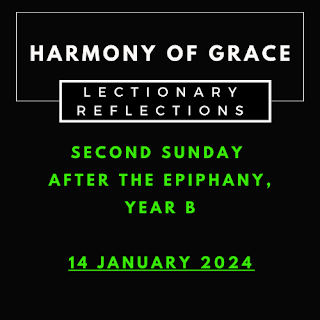14 January 2024 - Second Sunday after the Epiphany
Theme
This week’s readings speak to us about how we listen and respond to God’s call. In John, Jesus invites Philip and Nathanael to follow him. Samuel contains one of the most well known passages in Scripture of a person hearing and responding to an audible call from God. In Corinthians and the Psalm, we are reminded that the God who calls us has created us and knows us better than we know ourselves.
Scripture Readings
- John 1:43-51 - Jesus invites Philip to follow him. Philip tells Nathanael who says that nothing good can come from Nazareth. When Jesus sees Nathanael coming, he declares that he is an Israelite in whom there is no deceit. He tells Nathanael that he saw him while he was under the fig tree. Nathanael then declares that Jesus is the Son of God and King of Israel. Jesus says that while Nathanael believes because of this, he was see much greater things than that. He will see heaven open, and the angels of God descending on the Son of Man.
- 1 Corinthians 6:12-20 - Although we have the right to do anything, not everything is beneficial, and we should not be mastered by anything. Our bodies are meant for God and God for the body. Through sex, we unite with each other in body, but when we unite with Christ, we unite with him in Spirit. Paul then teaches that we should flee from sexual immorality because whoever sins sexually, sins against their own body. Our bodies are temples of the Holy Spirit and we should honour God with our bodies.
- Psalm 139:1-6, 13-18 - The Psalmist declares that God knows them inside and out. God knows before they speak or act. God created their very being and they are fearfully and wonderfully made.
- 1 Samuel 3:1-10, (11-20) - Samuel hears someone calling him three times. Eli says each time that it was not him. After the third time, Eli realises that it must be God and instructs Samuel to reply, “Speak Lord, your servant is listening,” if it happens again. When Samuel tries this, God tells him that he would punish Eli’s family as He had promised. Samuel was afraid to tell Eli the vision, but Eli forced him to speak and Samuel told him everything. God was with Samuel as he grew up and he was recognised by all as a prophet of the Lord.
The Context
Nathanael’s ultimate testimony that Jesus is “the King of Israel” in John’s Gospel this week foreshadows Pilate’s sign on the cross at the end of John’s Gospel, the scornful inscription pronouncing Jesus “the King of the Jews” (John 19:19). The two titles function as bookends in the overall narrative of John, and so for listeners who know the end of the story, Nathanael’s words here are a poignant mix of celebration and sorrow. The call to follow Jesus is a call toward difficulty, not away from it.
Personal Application
As Samuel, a young boy, sleeps near the Ark of the Covenant in the temple, he hears someone calling him. His natural reaction is to respond to who he thought was calling him: Eli. After this happens three times, Eli tells him to stay put and see if the voice has anything else to say.
How often do we to react instinctively to the voices calling to us in our lives? We see an advertisement calling us to buy the latest and greatest product and our first instinct is to do so. We see a politician, musician or social media influencer calling us to a certain way of living and we jump at the opportunity to imitate them. Perhaps we even suspect that we are hearing a call from God and jump to respond in our haste. Maybe Eli’s words to us can be a helpful reminder that sometimes a slower, more considered response can be more beneficial as we try to listen to and discern God’s voice in our lives.
What voices are dominating your life at the moment? How could you find ways to slow down and be more attentive to where God may be calling you?
Communal Application
We all, as communities and individuals, strive to live with purpose. Living a directionless life is draining as well as pointless. It messes with our sense of self-worth as well as emptying us of ambition and hope. As believers, we desire to get our direction and purpose from God.
In our story today, Samuel found himself in a time where God’s people were lacking direction. “The Word of the Lord was rare.” Many would perhaps argue that in today’s world, the Word of the Lord is indeed rare as well. I wonder if this is because God is not speaking, or if we are just failing to listen adequately?
It is loud in our world with distractions aplenty. It is loud in our souls, where we are filled with our own questions and fears, failures and inadequacies. It is so loud that we don’t hear the Voice anymore, the Voice that leads and comforts, the Voice that challenges and guides. We don’t hear it anymore because we’ve stopped listening, or it sounds just like all the other voices around us. No wonder Samuel thought he heard Eli, it was the voice he was so familiar with.
What is the voice we are so familiar with that we mistake it for the true Voice of God? How can we learn to listen deeper to God’s voice? What might we hear if we do?

Comments
Post a Comment